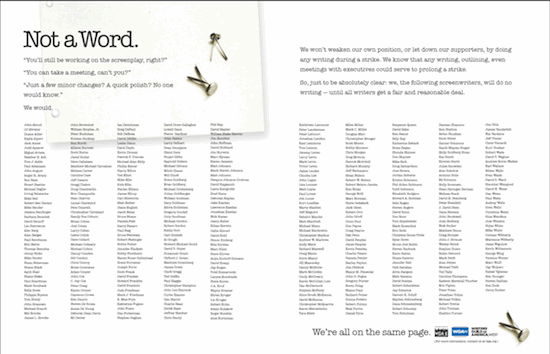Last night I went out for beers with my picketing team from the Van Ness gate. I hadn’t spoken with any of them since the end of the strike, so it was nice to catch up, and see them in clothes not specifically chosen for walking in the cold.
Remarkably, it was the first conversation I’d had about the strike in over a week. After three months of talking (and blogging) about nothing other than the AMPTP, the NegComm and picketing schedules, it’s surprising how completely the strike has vanished off the radar.
With the official contract ratification results due today, it feels like a good time to take stock of where various projects have ended up in a post-strike universe.
The web series
—
We’re finishing editing on the [web pilot](http://johnaugust.com/archives/2008/seeing-other-people) I shot at the start of the month. Once it’s done, the financiers will go off and look for distribution and advertising partners. If we can find the right combination, we’ll aim to shoot a block of episodes this summer.
Shazam!
—
I spent the weekend barricaded at the Disney Grand Californian working on the next draft of Shazam! I’d gotten the studio and producer notes just before the strike, so this was my first chance to address them. It was great having a three-month break from the script, because it meant I could look at it with fresh eyes.
There are some web reports out of WonderCon about a possible title change to something longer and more Harry Potter-ish. Nothing’s decided yet. Obviously, one of the challenges with the property is that an audience will automatically assume that the hero’s name is Shazam, when it’s not. ((Shazam is the wizard who bestows his powers; the guy in the cape is Captain Marvel. For legal reasons, the movie can’t be called Captain Marvel.))
Dreamworks project
—
When the strike began, I was halfway through the first draft of an unannounced project for Dreamworks, with a major star and director involved. Without being too specific, Something Happened unrelated to the strike which made it very unlikely that our movie could (or should) get made. So one of the first conversations I had after the strike was with the producer and director to figure out whether or not to proceed. After about 15 phone calls, many involving agents and executives, the decision was made to kill the project.
It was the right choice. While it’s hard to walk away from 55 pages, finishing the next 55 while almost certain that they could never be filmed would be even more dispiriting. As I write this, it’s not clear whether I’ll segue into a different project for the studio, or just write them a check for the money they’ve already paid me. Either way, I feel better getting to work on a script that is much likelier to become a movie.
Heroes: Origins
—
My hunch is that this [spin-off series](http://johnaugust.com/archives/2007/heroes-origins) will stay in the [deep-freeze](http://johnaugust.com/archives/2007/no-heroes) for a while, maybe never to be thawed out. Tim Kring has said in interviews that the priority is getting next season’s plotline (“Villains”) ready for launch, as it should be. If Origins is resurrected at some point, I’d be happy to direct my episode.
 ](http://johnaugust.com/Assets/not_a_word.jpg)
](http://johnaugust.com/Assets/not_a_word.jpg)